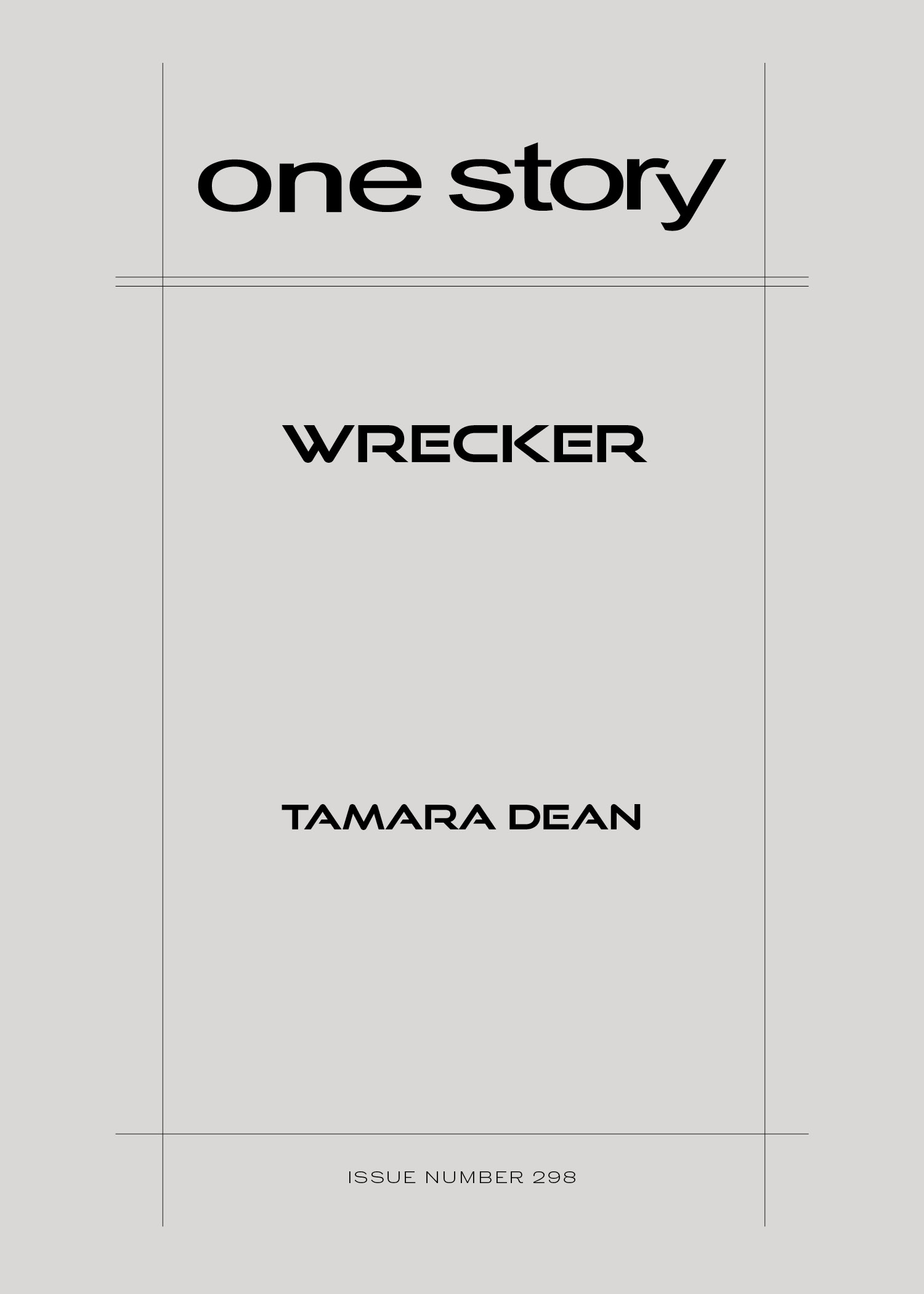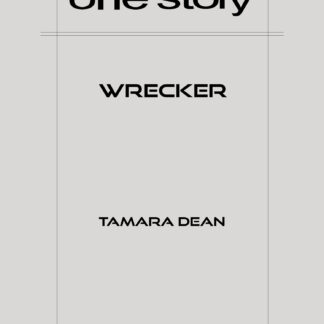
Wrecker
$2.50
83 in stock
Excerpt
Rena was staring at the spinning snow and speeding on the turnpike, adding miles between herself and home; then she was fishtailing, braking, braking, swerving left of the far-left lane. Her Honda bashed the guardrail. Her body slammed the seat. With her car stopped dead still, only the snow moved around her, and in the surprise of that stillness, she shook. The shaking was involuntary. But she could control other movements. Turn off the ignition. Lift her foot from the brake. She would suffer a bruise where the shoulder belt pinned her chest, but no worse. The windshield was unshattered. Steam curled and rose to melt the snow falling onto her hood.
This was nothing. She was fine. She unbuckled and felt around the passenger’s seat for her phone.
“I’m so sorry, ma’am,” the towing company’s dispatcher said.
“It’s nothing,” Rena said.
“Promise you’ll stay in your car until our driver arrives, for your safety.”
Still shaking after the call, Rena clutched her phone. A few years ago, she would have called her husband, Cameron. She would have said, “I must have been daydreaming. You know how I am,” and he would have said something brief and plain, like, That sucks.
Tamara Dean
Tamara Dean’s stories and essays have appeared in The American Scholar, Creative Nonfiction, The Guardian, Orion, Seneca Review, The Southern Review, Story, and elsewhere. She’s also the author of The Human-Powered Home and bestselling textbooks on computer networking. She teaches writing workshops through Hugo House and The Loft and independently. More at www.tamaradean.media.
Will Allison on “Wrecker”
Forgivable or unforgivable? That’s the question by which Rena, the decidedly unsentimental protagonist of “Wrecker,” measures her choices in life.
Take, for instance, her decision to arrange a tryst with an anesthetist in Toledo she met on a dating app.
On one hand, Rena is married.
On the other hand, the tryst was her husband’s idea. (“Enjoy life,” Cameron said. “Go out, get laid.”)
On the other, other hand, Cameron is incapacitated and dying from a rare neurovascular disease.
On yet another hand, he didn’t just suggest that Rena get laid, he insisted, “actually growled.”
But Rena “hadn’t felt like it, hadn’t gotten around to it until now,” and that’s where this month’s story opens, with Rena en route from Evanston to Toledo, crashing her car into a guardrail in a snowstorm, in bad need of a wrecker.
Enter Hector, a lumbering tow-truck driver of few words whose casual assurances and lack of pretense are comforting to Rena. Their brief time together surfaces her ambivalence about meeting up with the anesthetist, but it also leads to even tougher choices about what is forgivable, what Rena owes herself and her husband, and what lies ahead for them.
In prose that is as unsentimental as her central character, Tamara Dean has crafted a quiet masterpiece that snuck up on me in the best way. I couldn’t wait to see what would happen when Rena got back home to Cameron, and now I can’t wait to share “Wrecker” with our readers. I think it’s a perfect story for a cold winter’s night, and I hope you’ll agree.
Q&A by Will Allison
- WA: Where did you get the idea for “Wrecker”?
- TD: It began with the image of a woman mesmerized by falling snow on a long, flat drive and spinning out. And I knew that this accident would somehow be the least of her worries.
- WA: What was the most challenging aspect of writing this story?
- TD: Finding out how her accident and time away from home changed her. The first draft ended about halfway through the current version. As I revised, I came to understand in what ways the story was about self-determination and self-care. While she’s beset by hardships beyond her control, she instigates another hardship—a minor one, by comparison, intentionally or not—that allows her to exert more control over her circumstances. That becomes a way of taking care of herself.
- WA: I love how unsentimental the protagonist, Rena, is. At one point, she tells Hector, the tow truck driver, “Everything will be unfixable someday. Us too.” Do you see Rena as more of a realist, or more of a fatalist?
- TD: She’s a realist. Maybe even an optimist. She’s trying to keep it together, make the best of things. Her hard-won approach leaves no room for false hope.
- WA: Another thing I love about this story is the way it forces the reader to grapple with moral questions. As the narrator puts it, “Forgivable or unforgivable? [Rena] measured everything she did against that question.” Did you ever worry that readers might find Rena’s behavior unforgivable?
- TD: That never occurred to me. I hope the story compels readers to empathize with Rena.
- WA: Hector, the tow truck driver, is a man of few words, slow to reveal himself. Were you surprised by anything you discovered about him in the course of writing the story?
- TD: I knew he would be the only character in the story who didn’t pity Rena or make demands of her. He’s dependable, nonchalant, and laconic, but those qualities also make him a bit of a blank canvas. So I was surprised to discover that he was carrying around the faces of loved ones and emblems of victory etched into his skin.
- WA: The story’s desolate winter landscape took me back, quite vividly, to the years I spent in Ohio and Indiana. Why did you choose to set the story in the rural Midwest?
- TD: For Rena, a lifelong Midwesterner, this is a landscape that’s utterly familiar, but also, in its present state, disorienting. It echoes how a person assumes things will always be a certain way and is caught off guard and has to adjust when they take a turn.
- WA: Sex scenes are notoriously hard to write, but I think you did a great job with the one in “Wrecker.” Do you have any advice for writing scenes of physical intimacy?
- TD: They are difficult, and I don’t think I’m particularly skilled at them! Trusted writer friends I shared early drafts of this story with urged me to be more specific, to not gloss over what happened between Rena and Hector. While the first draft didn’t literally end with them driving off into the sunset with dot dot dot after the last word, it wasn’t far from that.
- WA: Who are some of your favorite authors, and what are you reading now?
- TD: My fervent wish, when I start reading or writing something new, is: Tell me a story I’ve never heard in a way I wouldn’t have imagined. James Baldwin, Kevin Barry, Jo Ann Beard, Deborah Eisenberg, Louise Erdrich, Denis Johnson, Yiyun Li, Alice Munro, and Ali Smith stand out. Recently, I was thrilled to discover work from Danielle Evans and Kathryn Scanlan. I’m currently reading Hungry Ghosts, a novel by Kevin Jared Hosein, along with Wisconsin Department of Natural Resources reports from the early 1970s for the essay I’m drafting.
- WA: How long did it take you to complete “Wrecker”?
- TD: I started the story in late 2020, worked on it for a few months, set it aside for a year, then revised it four or five times in 2022. My writing is like slow embroidery. I pick up and put down pieces repeatedly over long periods of time. I have several projects going at once in this way. Rarely does a story come to me in a rush, fully formed.
- WA: What are you working on now?
- TD: Novel, new essay, essay collection, short story revision, and teaching writing workshops. I’m excited about all of them.
- WA: What is the best bit of writing advice you’ve ever received?
- TD: During my MFA program at Vermont College, I studied with Bret Lott, and he said something that stuck with me. When he sits down to write, he tells himself, “I know nothing.” This is good advice for someone like me who tends to analyze, plan, and overthink things. Meet the work without preconceptions, and let it tell you where to go next.
